//
We’re living in the in-between
We dived with intention but the free fall
made us question our positioning and potential
//
In this suspended state
anything seems possible
//
//
We’re living in the in-between
We dived with intention but the free fall
made us question our positioning and potential
//
In this suspended state
anything seems possible
//
I’m proud to share my very first published book review for BookPage!!
Multiple Exposure by Ellen Crosby
“This is the part where you find out who you are”
— For me, this is such a beautiful and inspiring quote —
Set against twilight,
that magical hour,
which holds so many promises.
It’s the mystical veil that keeps me guessing at hope.
I am the optimist,
the pursuer,
reaching that hope and seeing myself in a new light.
I accepted the challenge of reinvention
and came out two steps ahead of everyone else.
It’s all about the incandescent, the desirable, and the nonsensical that live in the in-between of real life. It’s the small glimpses of pure pleasure and passion that can only be realized through the slow curl of a smile, and the startling throw of your head at a single laugh.
It’s about the dreaming and the feeling of ambition that motivates us forward. It’s that French song playing candidly in the back of your mind as a soundtrack to your afternoon. It’s that book you reference as an explanatory means to your momentary bad luck.
It’s about knowing reality and the make-believe, and dangerously flirting with the diaphanous line that separates the two. It’s about being happy in the moment, letting go of the past, and not burdening the mind with thoughts of the future. It’s about floating and not touching any boundaries.
Of course, this state is not constant, but a momentary happenstance of joy. It is the inhale before the dive.
This moment lives in that breath.
Reviewing a recent post “a transition” I realize that I need to start incorporating more artwork into my posts about thoughts on life. Art is beautifully expressive, not only to the individual who creates it but also, to the viewer.
Georgia O’Keeffe has always been one of my favorite artists. One afternoon while sitting in an introductory art history class, her White Trumpet Flower flashed onto the projector screen. Unlike the other artwork being shown, the quite strength and serenity of the flower engulfed the screen. Its illuminating presence captivated me
But to follow up with a post about growth and movement I find her large flowers to be the perfect compliment. They are bold, beautiful, and unabated. Something I also, wish to master when it comes my life. The exotic nature in which O’Keeffe captured the flowers’ essence was extremely controversial. The sensuality of her paintings both infatuated and brought about strong disapproval from viewers.
BOLD: I want be bold and daring, taking new chances and challenges when the opportunity presents itself.
BEAUTIFUL: I equate true beauty with elegance, something that is level, calm headed, and confident.
UNABATED: I need to be relentless in my pursuit of passion as I experience and grow.
Kerameikos, the ancient Athenian cemetery, lies west of the Agora outside of Athen’s walls. This site contains an interesting archaeological find, a broken Kouros figure. Normally, a find like this would spark no more interest than usual, but it was found outside of its stratigraphical layer. In 2002, a German archaeologist excavated the area of Kerameikos to find bits of sculptures compacted together. Rather than being found amongst other sculptures of distinguishing Archaic characteristics, the figure rested with multiple centuries of archaeological remains. Originally, sculptures such as the Kouros figure would come from grave enclosures owned by aristocratic families, but during the Persian sack of Athens, many of these were destroyed. During the construction of the Sacred Way by Temistokles in 479-478 BC, the pieces of statues were used as road filler to strengthen the road. This is indicated by wheel marks that are left on the back of the Kouros figure

Speak It.
Not only is speaking Greek part of your grade if you decided to take Dr. Anderson’s Greek Civilization course, but it is a great opportunity to get outside your comfort zone and immerse yourself into the culture. First things first, get down the basics, they go a long way. Always know how to say please ‘parakalo’ or thank you ‘efkharisto’ in whatever country you are visiting! And it is beneficial to familiarize yourself with the conditional of ‘to like’ that way you are more polite when asking for something from a street vendor, waiter, or hotel manager. In this case tha-i-the-la… translating to I would like… is perfect! Your attempt to communicate in Greek is appreciated, that small amount of effort goes a long way. The people are grateful you are trying to adapt to their culture rather than expecting them to speak to you in English. And hey, if you have darker features and a good accent people even think you might be Greek! It happened to me!
An important thing to remember with languages is that it is not always about the talking; listening is a huge part of communication. Listen for where the emphasis is placed on words. An important word to get the correct emphasis is thank you – ef-kha-ri-sto – emphasis is on the end of the word. Also, listening to your surroundings enables you to pick up on words said on the streets. For example, while in Athens you’ll ride the metro, the stops are announced first in Greek then English, so you can pick up on the word next and stop. Something that does not appear in English but is common in other languages is informal vs. formal usage of words to address different groups of people out of politeness or respect. Geia sas is a formal greeting to one person, or informal to a group, while geia su is informal. It does matter that you use these correctly.[1]
Document it.
Okay, I’m not saying you have to have a diary to write elaborate entries into every fifteen minutes when something spectacular happens, but to simply write down names of places you’re going, restaurants your eating at, and even what you’re eating is a great souvenir. I did not really get this memo before I left for the trip, but I purchased a tiny notebook with a penholder that I could easily slip into a pocket or my shoulder bag for quick notes, new words l had learned, or quick sketches. Several students had Moleskins that have a collapsible pocket in the back, which turns it into a great place to stow I.D. and Euros. Taking pictures is also a no brainer, but many times students forget to actually get in the pictures! A playful way to document your trip is by shooting videos. One student accomplished this through a video recording application on her phone, then later compiled and edited the footage to make an outstanding video! Another great souvenir that will be truly memorable!

Eat it.
A common question that came up a lot was to tip or not to tip? Well, all in all you don’t have to tip, it is already included into the price of the meal. But then sometimes with a large group and ordering a lot of food however, the owner will give you a complementary dessert or dessert shot, and it is nice to leave a couple of coins per person. Think of the desserts as a silent thank you for your patronage, and the coins as a tip of the hat to your appreciation of their gift.
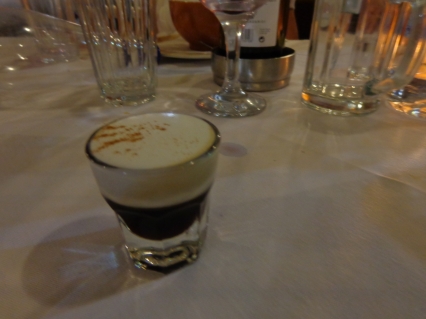
Be prepared to eat delicious food for a very long time. Normally we eat dinner around 6-7ish in America, but in Greece dinner really gets going around 9ish. So your dinner group will more than likely be the only people at the restaurant, but this means no waiting and you get the pick of the tables! Dinner will last well over two hours. It is not like America where the waiter is a pissed of college graduate and the restaurant is more concerned about getting people in and out of the door as quickly as possible to make a profit. It is a very casual and relaxed atmosphere, and when the waiter walks by with out saying anything to you, he is not ignoring you; he is letting you enjoy your meal, rather than pestering you every 4 minutes about refills.
I know you have sat down and properly budgeted all your money for the next three weeks. Right? Sure. Well I want shove this in the back of your mind, keep pushing till it hits the back. Great! Be dualistic with your food money, conserving it during some meals, while splurging on others. I found it easiest to save my money during breakfast and lunch. Normally a traditional Greek breakfast consists of a hot cup of milk, tea or coffee with toast and spanakopita, a spinach and feta pastry.[2] All of the hotels during your stay have decently good continental breakfast! This consists usually of coffee, tea, juice, water, Greek yogurt, honey, cereal, feta, tomatoes, cucumber, kalamata olives, cheese, bread, and ham. These items were the basics and each hotel had variations of these. But wait till you arrive at Mykonos. Poseidon Hotel had the most amazing continental breakfast! Playing into the stomachs of their predominately Western European and American visitors, they had all the elements of the other hotel’s breakfast, but also spoiled us with bacon, eggs, pancakes, Nutella and a fresh pressed orange juice maker!
Typically, lunch is Greece’s main meal, consisting of a meant and pasta or rice dish,[3] but for Americans it isn’t this way, we hold out until dinner. For a fast lunch, it is easy to find a shop that sells gyros right on the street, there is no need to walk into the restaurant, it has fantastic ‘walk through’ windows if you will. To my surprise, I came to find out that a majority of gyros have thick French fries stuffed into them! The tomatoes, cucumber, onions, and tzatziki sauce were no surprise, but French fries? The majority of the days when the group is walking between museums or sites, gyros are Dr. Anderson’s go to meal: quick, easy, cheap, and delicious! Another great way to save money is having a small picnic of sorts. If you are going out later on in the evening and you would rather save some money for drinks or gifts, go to the local market and pick up salami, cheese, bread, almonds, and fruit. You can easily walk out of the store spending under six euros and have a wonderful tapas dinner! Unbelievable right? Yes, it’s true!
One day I highly recommend you splurging on lunch is in Santorini! It is just a short 20 minute bus ride to Kamari Beach, but once your there you will find the most amazing pizza place Bella Napoli, where the owner is a descendent of the decadent pizza gods from Italy. If Dr. Anderson says it is the best place to get pizza in Greece, then it is the best place in Greece to get pizza. The restaurant sits on the shore of a beautiful pebble beach and where two other students and I had front row seats. Tha-i-the-la margarita pizza parakalo!! Yum. Also, definite splurge moments, the infamous lamb in a clay pot at Estia, a lovely restaurant in the Plaka in Athens. We frequented dinner here so often that the waiters began to fight over serving us!
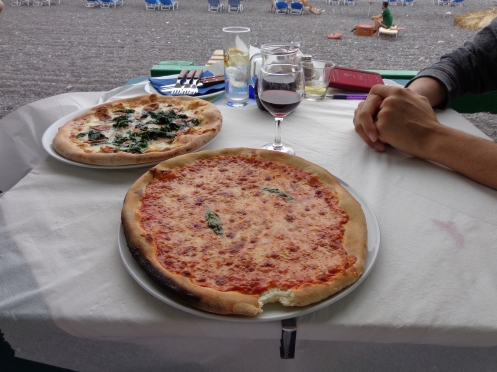
Explore It.
Just walk away. If there is an opportunity to venture off from the larger group, whether by yourself or with one or two others, DO IT!! Unless you become horribly, horribly lost, you will not regret this. I have too many great stories to share in this tiny space, but I will tell you one of the things I learned about venturing out on my own. It allowed for pertinent ‘me’ time. Spending three weeks with a large group can become draining, and desolate of time to recharge. So, get out there and explore! You don’t have to become the ‘loner’ of the group but simply having that curiosity will lead to great rewards!
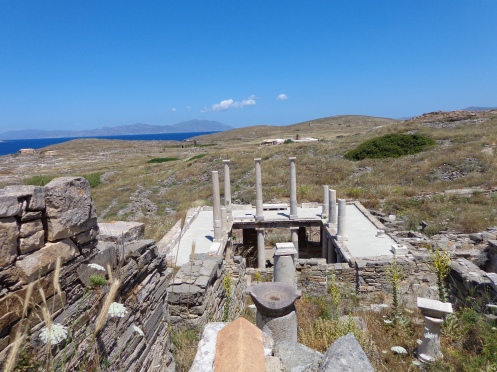
My experiences and advice to you was compiled through pure and simple observations and interactions with peers, teachers, tour guides, locals, the book Eat, Pray, Love, and a little Greek phrase book required for a class. Though I am not a world-renowned travel writer, I did study abroad for three weeks, giving me the validation I need. The stories I give to you are authentic and the advice I tell is sincere. I want you to have an amazing time, and me sharing this with you is the only way I know how to help! So, Enjoy!
[1] People will indicate whether to use the informal form of the word. If people you meet are more willing for you to address them in the informal they might say something along the lines, “mi-la mu ston e-ni-ko” roughly translating to ‘speak to me in the singular.’ Lonely Planet: Greek Phrasebook, ed. Meladel Mistica (Australia: Lonely Planet Publications Pty Ltd, 2012), 109.
[2] Lonely Planet: Greek Phrasebook, 157.
[3] Lonely Planet: Greek Phrasebook, 157.
Okay, maybe not a checklist, but things to at least think about before the trip.
An Introduction
Know the teachers who are accompanying you on the trip. Many times your study abroad leaders are teachers who are unfamiliar to you. Go to their office and introduce yourself so they know who you are and you can become familiar with them. Do not wait until you are in Greece before you start asking them questions. Also, when you have group meetings, and you don’t have a conflict but you do have a warm comfortable bed, just get up and go. These meetings might be inconveniently scheduled for Saturday mornings bright and early, but you’ll get some questions answered and meet the people on your trip.

Orientation
Pay attention to the study abroad orientation. So many students either blow it off, getting a friend to sign in for them, bring homework to work on or just don’t pay attention. It’s three hours of your life that you won’t be losing. Plus there is free coffee, and sweet treats like cinnamon rolls and morning muffins. You can do it.
Packing
You will hear this one million times, but here is one million and one: pack light! Start off by packing clothes that are comfortable and light: t-shirts, shorts, jeans, underwear, cute tank tops (remembering a cover for going into churches or monasteries), a laundry line and detergent! My roommate brought along this great laundry line that twisted so you could easily hang clothes on the line without pins, fantastic invention and highly recommended. Okay, look at all the clothes you just laid out and eliminate 20%. It’s okay, really you don’t need that many clothes; you’ll be doing laundry occasionally. Plus, you are there three weeks; you’ll come to find that some pieces of clothing you brought are more comfortable and more practical, wearing these in rotation.

{Side note – do not try to hang dry laundry in the mountains, like Olympia – your clothes will not dry. I repeat YOUR CLOTHES WILL NOT DRY. Now, you might have more luck with the weather than I did, but the moisture in the air there is not your friend. Best places to hand wash laundry – Athens, because it is so hot and humid and the Islands, because of their gorgeous breeze.}
Pack both for warm and cold weather, mostly warm, but we hit a 60-degree rough patch one day in Delphi when we were exploring the Upper Sight. The misty rain and fog did not help the situation, and for someone who had no warm clothes or closed toed shoes, layers became my best friend! It wasn’t the greatest day, but it was an adventure, so do I really regret not packing warmer clothes… not really. I’ll sacrifice one day of warmth, for a lighter suitcase. You have to cart those things around EVERYWHERE, and it is not fun. Also, packing light keeps you from asking others to carry your suitcases and keeps your personal items safer. Remember you only have so many hands.

With clothes being mentioned: for the day, I chose to stick with breezy tops and shorts, but for the evening I did dress it up a bit. I feel like I was taken a little more seriously rather than another ignorant American college student studying abroad. But then also, you will always look American, no matter what you do, so embrace it to the best of your abilities and be a great representation of what college students should act like or you can continue to be that American, your choice.
Be prepared to lose at least one article of clothing. It could blow away while line drying into the hotel’s neighbor’s garden, or become missed placed/forgotten while out. This happened to me, but I miraculously got back my favorite sweater while out one night in Delphi. Another group of college students from Nebraska happened to also be staying in the three road town, so it was easy to find our group and return the sweater. A common practice for traveling abroad is packing older clothing that can be left after wearing it. Some students decided to leave old articles of clothing or shoes opening space in their bags before the trip home. I encourage you to not do this until the end of your trip, because Isabella, the tour guide, will take your unwanted items and give them to families in need.
Shoes: they must be comfortable. I know this is a simple statement, but it can be easily overlooked. Just because your favorite pair of shoes to wear around campus for a day doesn’t bother your feet, they will in Greece. You do some serious walking here which starts to add up to miles and hours, not the short walk in-between classes followed by 50-minute classes where you sit. I only packed two pairs of shoes: a nicer pair of sandals for dinners and nights out, and I saved up my money for a pair of Chacos, a sporty form-fitting activity sandal with great support. But with these shoes be ready for great Zoro inspired tan lines on the tops of your feet.
Toiletries: try to keep them as small as you can. I know this probably goes without saying, but I had to mention it. I understand that some items do no come in travel size. My solution for packing travel toiletries and not knowing how much shampoo and conditioner I would actually use was to pack one travel bottle per week of each. This way once I finished a set, I could easily throw it out, opening room up in my suitcase! Also, bring a washcloth, luffa, or something. You will need it to scrub off all the dirt on your feet. Don’t say eww, it is not that gross. Don’t worry too much about forgetting something, chances are someone else on the trip will have it, or you can buy it.
Homework
Tired of talking and thinking about packing? Well, let’s briefly skim through another unfavorable part of the trip. Homework. You will be recommended to finish and turn in your work before departure. You can attempt to do this at the end of an already hectic semester on top of all your essays and final exams, or you can save it for later. Most days finish around two, so the rest of the afternoons are free to explore and do whatever you like. On some days, especially in Athens, it was nice to relax on the community porch (from which you can totally see the Parthenon!!) and work on homework. Another option is to save the work for the plane rides. I mean they are about 11 hours, what else are you going to do? Awkwardly try to sleep in an uncomfortable upright position? I couldn’t do it, so I wrote my little heart out.
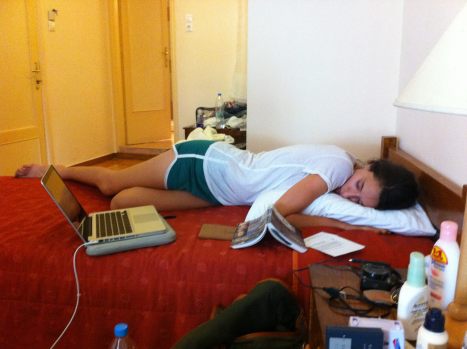
This advice was originally written as an eleven page paper, but realizing that nobody would ever read such a long and boring post, I broke it up into smaller sections! I tried my hand at a different style of writing, keep my thoughts and points crisp and at my best attempt, witty. It’s different for me so I hope you enjoy!
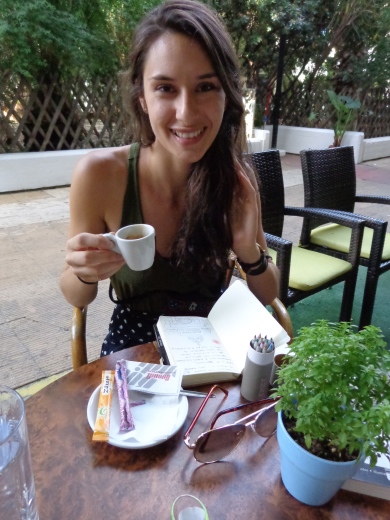
Three words to remember Indulge, Appreciate, and Relax
I want this advice to be casual and personal with my best attempt to be witty and entertaining, and though I don’t have a good history with either, I will try my utmost effort! There are many times when I simply wished to talk with a former Greece study abroad student, but never found the means to do so.
Understanding through the eyes of a peer is drastically different than asking a teacher or doing personal research, both are still very helpful, but knowing what to wear and what to expect was a challenge. So, here in this travel guide, my hopes are to pass the knowledge I gained on to the next group of students. I will share my knowledge about the pre-stages of traveling on a study abroad trip, and advice when you finally arrive, all while tangling in my own experiences and stories from Greece.
First, let me explain the three words I attached to the title of my advice; one I learned to do while there, one I still can’t understand fully, and one that is critical for fully enjoying the experience. All of these culminate together to recognize the value of the journey.
I wish for all study abroad students to indulge, for this is a once and a lifetime opportunity, whether you have traveled abroad before or this is your first time. Each experience is unique and invaluable. Now, I said indulge, not be immature or obnoxious. You are American and judgment will inevitably be passed on you, but that is his or her problem and not everyone you meet. You are over the age of 18 and should know how to conduct yourself with composure and humility, while still having a wildly great time!
While abroad, do not forget to appreciate your surroundings and the people who enabled you to be there. For someone who had not traveled abroad before the Greece trip in 2012, I was naïve in my expectations for I had nothing to base them on. Once there, I was like a little kid glued to the TV, completely stuck, captivated by the pure joy of being in Greece. I was grateful for every little reaction to the breathtaking views, interaction with the locals, the knowledge I gained from ancient sites, the incredible art I saw (both ancient and contemporary), etc.
Finally, and most importantly, you must relax, so you can fully enjoy your abroad experience. If you are uptight, worrying, and stressing out over everything you’re vision will become clouded and you won’t be able to see all the potential opportunities for an amazing experience. I will also admit, that this advice is coming from someone who assumes that you have all the technical things already figured out, such as budget, passport, paperwork, etc.
Reflecting on my day, it was very long, strenuous, and displacing. As graduation approaches, I fear that I may not find a job come October, once my internship has ended. All I wish to recount from this long day is the steam sticking to the windows of my office building from the heat of a Nashville summer. The building isn’t truly mine; I’m just interning. I just claim ownership for now. It is a place I feel at home and welcomed.
With a recent move to the east side of Nashville, my life has been uprooted and replanted. It is odd to make such as comparison, though. Comparing my transitory moments to the repotting techniques of a gardener seems both fitting and misplaced.
The more cautious side of me hesitates at such a harsh and brutal uprooting; I was happy where I was. The shock will surely kill my mind screams! But in the back of my mind I know that if taken care of properly, everything will turn out to be all right.
But as usual, impulse is overcome by reason. The nature of the object (my life in question) would be content, as is, but the brutal awakening of the transplant is room to grow.
Queue nurture. As I develop more ideas, experiencing, learning, and living I begin to expand. I need more room.
As I was packing to move into my new house, my dad mused, “Well, first is was one trip in a van to get you moved into school, then it was two vans and a car to move you out of school, now it is a U-Haul trailer and a car. Next, is going to be a moving truck, I guess. You sure do collect more things than you realize as you get older.”
My roots are thickening, further penetrating the soil and taking hold. It is a wonderful feeling, this growing up. I’m accepting it with every heartfelt laugh and tear, every new exposure and loss, and also, every mistake. I take pride in those, however, hopefully I don’t have too many. But by making mistakes I know I am living. It means I’m learning something new, which for me is one of the most rewarding experiences.